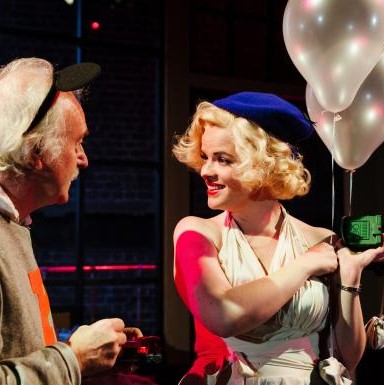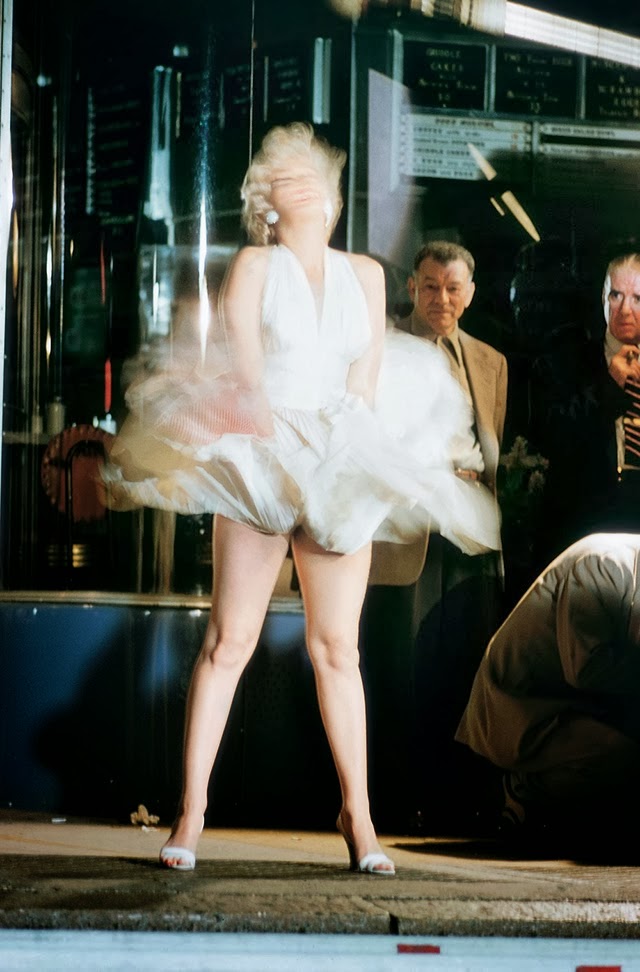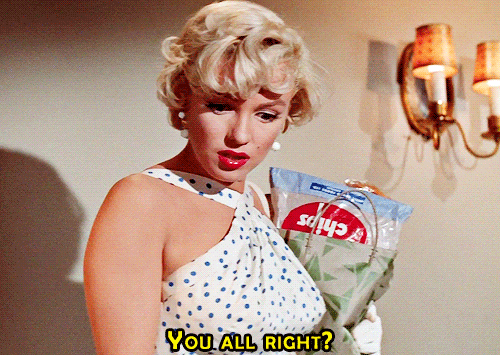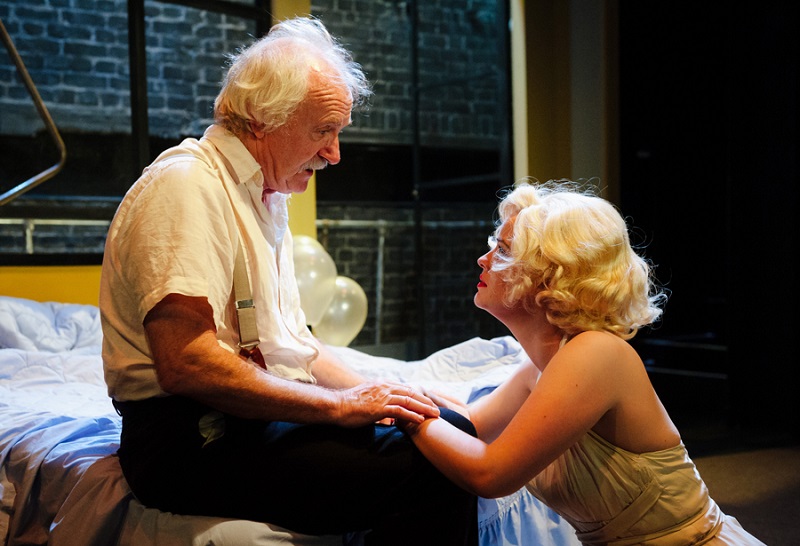
"Beyond the dumb blonde drag, Marilyn Monroe was a keenly intelligent person"
Lifelong Marilyn Monroe fanatic and wig critic Fallon Gold heads to The Arcola for a revival of 80s play, Insignificance.
Let’s get this out there first. I fell for Marilyn Monroe when I was a kid and have had a duel fascination/extreme criticism of anyone playing her ever since. Probably one of the most impersonated stars of all time she is also the one who is most often done badly. And that is because people often impersonate her roles (the uber dumb blonde types of Lorelai Lee or Pola Debevoise) or a surface, exaggerated idea of her. She didn’t talk like Lorelai all the time. That was a character. Of course, when a real person is portrayed in fiction they are a character. But, as the great essay by Lois Banner in the Arcola production programme points out, Marilyn Monroe was a character that was invented by Norma Jean Mortensen. She was an exaggeration of femininity and feminine wiles. Marilyn Monroe was a drag she put on. But that’s exactly it: she put it on. But wasn’t like that all the time. Sometimes she didn’t talk like Sugar Kane.
During my hyper fandom I experienced Insignificance the first time round. Not as a play (although I longed to see it) but its film version, directed by Nicholas Roeg and starring Teresa Russell. That film feels very much like the play it is, but it still works cinematically. And I liked Russell, so I didn’t dislike her performance. The wig is awful though.
The story of Insignificance is a great conceit. It revolves around a fictional encounter between Marilyn and Einstein where she pays him a surprise visit to demonstrate the theory of relativity. Also present throughout the night are Monroe’s then husband, Joe Dimaggio, and Senator Joe McCarthy who is hounding Einstein to testify for HUAC. Real events of her life are twisted into fiction. Monroe idolized Einstein and he knew this, though they never met. Or they did meet and had an affair, according to Monroe’s once roommate Shelley Winters. Marilyn would encounter McCarthy later in her life when his communist witch hunt went after her next husband, Arthur Miller. Rumour has it he said he’d lay off Miller if he could have a photo taken with Monroe; she strongly declined. Monroe’s fragile marriage to Dimaggio broke when he viewed her – along with thousands of New Yorkers – having her dress ‘blown around her ears’ in the iconic scene from The Seven Year Itch. And it is the night of that shoot that this play takes place.
I was excited yet cautious when I heard that The Arcola Theatre were putting on a production of Insignificance. Excited because I know it’s a good play and I love nothing more than a biopic – or bioplay. Cautious because I know that Marilyn is a role that is so easy to get wrong and would be excruciating to watch for two hours if that were the case.

What we are shown in Insignificance is that beyond the dumb blonde drag, Marilyn Monroe was a keenly intelligent person. Hungry for knowledge, she was a voracious reader and hung out with intellectuals. Of course this seems like an ironic dichotomy to her personae. And because the idea of a beautiful, sexually charged woman being an actual thinking being is still anathema to the prevailing misogynist culture we live in, there are still people who think it was all pretension – the books were carried and she was photographed with them open, but of course she never read Beckett’s Ulysses or understood complex psychology texts. She hung out with intellectuals because they worshipped her as an object and curio, not someone they could have a conversation with… and someone she could have an intelligent conversation with away from the shallows of Hollywood. But this is judgmental bullshit. The constant suspicion of the manipulation of woman. And the discomfort that that piece of meat that is there for the fantasies of others is actually a thinking, feeling human being who is super canny and an actual genius at what she does. And she knows exactly what the character of ‘Marilyn Monroe’ can do. That was her power.
There’s a worry in Insignificance that having Monroe explain a complex physics theory about the universe to the genius whose head it sprang from is making her into a bigger joke than she was perceived to be. Or that it’s hugely patronizing (incidentally the character in the play constantly calls out instances where she believes she is being patronized). But it’s not. And it isn’t just when she’s demonstrating relativity that her intelligence comes to the fore. It’s in every conversation with every character in this play. She has a depth of knowledge and insight that is keen and nuanced. And so, this character – known only as The Actress in the play – is one of the deepest Marilyns that has ever been written.

There is an added pressure for the actor playing this role. She’s done out in her Seven Year Itch white dress, her most iconic costume. It makes sense here because she’s come straight from the set. This isn’t just a lazy fancy dress idea. My only criticism is one I have of virtually every single Marilyn impersonation ever – the wig is all wrong. I have a keen wigdar and not only did Marilyn’s bleached hair look – mostly – surprisingly not wiggy, it was a very specific short do at the time this play takes place. Once again this Marilyn is kitted out in a one length bob, a hair style that she never actually had. She would either have swept up or aside bangs or – as is the case for Seven Year Itch – a short, curly do. It wouldn’t be difficult to get a wig made that looks like that. The closest I have ever seen was Michelle Williams in My Week With Marilyn. And that accuracy added to the verisimilitude of the performance and distracted from the fact that Williams’ face looks nothing like Marilyn’s. When you plonk an obvious (and wildly wrong) wig on a Marilyn it just looks more like caricature than character.

Other than that, though, Alice Bailey Johnson gives us a great Marilyn. The fact that she happens to be the daughter of the playwright is purely incidental. She makes us care about Marilyn but not in the usual way – we are not feeling sorry for a victim, but see instead a savvy whole person who is going through a shit time but can also find joy in her lifelong pursuit of knowing the world. Johnson doesn’t overdo the verbal or physical ticks, but presents them at just the right time when they’re being used for manipulation. Her interactions with these three domineering men shows a woman who knows exactly what each archetype is and how to use that to her advantage. As great as Tom Mannion as The Senator and Oliver Hembrough as The Ball Player are, the play belongs to The Actress and The Professor. They get the chance for greater tone but also pull off the chemistry between their characters to a tee. Simon Rouse as Einstein could easily have also fallen into caricature, but his Professor portrays the wonderment of finding this woman in his room and his rage at the bullying pursuit of McCarthy with precision and grace.
I said above that this is one of the best written Marilyns. But I didn’t get that feeling from the film, so the power of it here must be a combo of the writing and better acting and directing than in the Roeg version. Sacrilege to say, I know.
Insignificance runs at the Arcola Theatre, London until the 18th November










